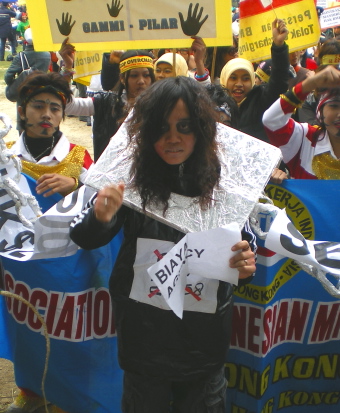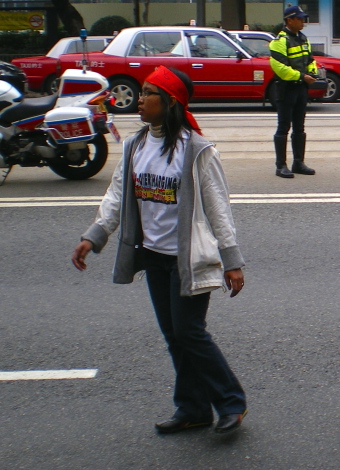Against the odds, Indonesian domestic workers have achieved real change in Hong Kong
Eni Lestari
When Wayne Palmer spoke to the head of the Association of Indonesian Migrant Workers about her experiences working and organising in Hong Kong, this is what she had to say.
What made you consider working in Hong Kong?
It was 1999 when I registered. I’d just finished high school and was thinking seriously about going to university. But the Asian Financial Crisis changed everything. All of a sudden there just weren’t as many jobs on offer. I helped my mother out getting things ready to sell in the market for a while, all the time wondering about what was going to happen to my younger brother and sister. I wanted them to be able to continue their education so I decided to try out looking for work overseas like other people in my village. It wasn’t until I was introduced to a middleman by a friend though that things really started moving. He knew all about the procedures and what had to be done. He then took me and some others to a recruitment agency. I didn’t have to pay him. But he didn’t pay me either. At that time I think they got a fee for each recruit they brought in. But nothing like the amounts recruitment agencies give these days. That’s quite a new practice.
Why did you choose Hong Kong?
Agency staff asked me where I wanted to go and I told them Hong Kong. I’d heard from friends working in Hong Kong that domestic workers get holidays and that the wage was high. Not like other countries like Singapore and Saudi Arabia. The agent told me that I’d get two days off and Rp 2 million (A$250) a month. I’d heard some different stories about work conditions but I wasn’t sure and it seemed like a pretty good offer anyway. Maybe the agent knew that I came from a family that didn’t have much money. I don’t know. They told me that they would organise everything free of charge and that I could pay them back once I started working.
Did you have to undergo training before you left?
I spent five months in the training centre learning English and how to cook and clean. It was hard sometimes because we weren’t allowed to leave without posting a bond with the agency. Something to make sure that we returned. I didn’t leave for the whole time I was there, though my family did come to visit before I left. I nearly got sent to Singapore because my English wasn’t good enough. But I was adamant about going to Hong Kong and I got my way in the end.
Was the job what you expected?
I didn’t see my wages for the first three months because the employer gave the money directly to the partner agency in Hong Kong. That’s how they used to collect their fees then. Now they make us take out loans with Hong Kong banks which we pay off ourselves. I was told about how it would work but I wasn’t really prepared mentally. Being in a foreign city with no money and no friends was tough. I didn’t get my days off at the beginning. I learned later that this was part of the strategy to make sure we didn’t have contact with the outside world. I started getting my two days off in the fourth month and found some friends in Victoria Park where Indonesian migrant workers get together on rest days. It was only then that found out that I was being underpaid and that in fact I should have been getting one day off a week. I was so upset. But I needed the job so put my feelings aside and continued working with my employer. I had to share a bedroom with my boss’s teenage son. And I had to sleep on a piece of cardboard on the floor. Some Hong Kong apartments are really small and not even big enough for the families, let alone a live-in domestic worker. Eating was also a problem. I was a better Muslim then and was more careful not to eat pork if I could avoid it. Chinese here eat a lot of pork so a lot of the time I was just given white rice and a boiled egg. I ran away after the six month because it was just too hard.
Where did you go when you ran away?
A major service providing NGO – Christian Action – took on my case. They helped me to report my employer to the Labour Department and get visa extensions. There are more NGOs that provide these services now but they have had a lot of experience dealing with Indonesian migrant workers. It took five months before my employer paid up. Even then it was only part of what he owed me. I was happy to take what I was offered. It was illegal for me to work so I racked up quite a bit of debt during those five months. I lived in shelters for the whole time but I didn’t stay in one place. It was hard to find an organisation that didn’t force their religion on us then. The Catholic shelter used to make us go to church on Sunday. I eventually found a place called Bethune House, which was more accommodating of other beliefs. It was more important for them that we helped out doing things like sweeping in the morning and not coming home too late.
How did you get interested in organising?
The whole experience made me wonder why Indonesian migrant workers do not have their own organisation, like the Filipinas did. The Indonesian Migrant Workers Union had just been established but not many migrant workers knew about it. And there was plenty of room for more migrant worker groups. So I asked some Filipino friends about how they went about setting up their organisations. They explained how to register them under Hong Kong law so that we can do things like use public spaces for events. They gave me some examples of what migrant worker group constitutions look like. I studied them with friends and together we put together our own constitution. The Association of Indonesian Migrant Workers (AKTI) came into being in 2000 on 1 October – which is also China’s National Day. But that was just a coincidence. I stayed in contact with Bethune House and their affiliate Asia Pacific Mission for Migrants, a research NGO, after I started with my new employer in order to help them handle Indonesian cases. Now as organisations we have a close working relationship especially when we organise things like outreach activities and demonstrations.
 |
|
ATKI members protest against agents' fees / Wayne Palmer |
How did things change for migrant workers after ATKI was established?
The membership really took off. There were already so many Indonesians in Hong Kong and more just kept coming so there was no shortage of members. Indonesian migrant workers were happy to have their own organisation. Filipinas, Thais and Sri Lankans had been organising for years and we could see the benefits of doing it but we just didn’t know how to get things together. There were also practical problems like what I mentioned before about having no days off. Mobile phones were also uncommon so communication was hard and we couldn’t predict when we’d be able to meet up. Things have really changed now though. There are so many different groups, ranging from dance to book clubs. You can see them in Victoria Park. But it wasn’t always like that. When I first came, Victoria Park was just a place where migrant workers exchanged stories about how hard things were.
What does ATKI do?
ATKI focused on counselling and educating workers about the law when it was first set up. These were the things that Indonesian migrant workers really needed. Back then we thought that all of our problems were because of the recruitment agents. But that’s not necessarily the case. Both the Indonesian and Hong Kong governments have made opportunities for them to exploit migrant workers. So it’s this that we’re working hard to challenge now. We put a lot of energy into pressing for policy change and developing better mechanisms to protect migrant worker rights. We – and other migrant worker organisations here – have had some real successes. Just look at the Hong Kong government’s approach now. They’ve translated the employment ordinance into Indonesian and hand us pamphlets about our rights when we go through immigration. Lots of agents confiscate the booklets along with migrants’ passports as soon as they leave the airport, but that’s another matter. We’ve also been working hard to make the Indonesian consulate accountable. Like everything else that’s a work in progress.
Does it mean anything that ATKI is not a union?
It means that we are excluded from a lot of UN and ILO activities because they only recognise unions. We didn’t know that when we first set up ATKI. But it hasn’t stopped us from speaking to government. Dialogue with the Hong Kong government has been a relatively simple exercise. Indonesia has been a bit more difficult. At one point we decided to bypass the consulate and went straight to Jakarta. We tried raising out issues with the Ministry of Manpower there but they told us to go back to Hong Kong and work through the consulate because that’s the procedure for handling migrant workers’ problems. The other issue was that we are a Hong Kong-based organisation. We’ve solved that by setting up an office in Jakarta. Now – in theory – we can dialogue with the government just as much as the Indonesian migrant worker unions can. We’ve also set up an office and shelter in Macau to monitor developments there.
Why don’t migrant worker organisations cooperate more?
That’s a difficult and easy question to answer. Of course we’d like there to more cooperation. But we all have different analyses and different priorities. That’s the problem. For example we have decided that the issue of overcharging by agents is the most important issue and we put all of our resources into dealing with that. Others think that underpayment is more pressing. We think that underpayment is just one scheme used by agents to overcharge so we’re happy to work with them on initiatives to press for change. So you see we cooperate when our priorities converge. Another problem is the fact that there are also just so many problems. So where do we start?
Eni Lestari (lestarihk@yahoo.co.uk) lives and works in Hong Kong, where she chairs the Association of Indonesian Migrant Workers.












